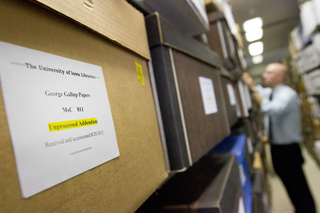The complete work of one of the University of Iowa’s famous alumni has found its home in the University of Iowa Special Collections and University Archives. The papers of the late George Gallup Sr. (1923 B.A., 1925 M.A., 1928 Ph.D.), founder of the Gallup Poll, now live within UI Special Collections after being generously donated by the Gallup family.
“This gift from the Gallup family is an incredible resource for the university, and one that will be eagerly sought after by researchers and scholars,” says Greg Prickman, head of UI Special Collections and University Archives. “The development of polling in the United States is a story with great historical significance, and these papers will open up that history for the first time.”
“This gift from the Gallup family is an incredible resource for the university, and one that will be eagerly sought after by researchers and scholars.”
—Greg Prickman
George Gallup Sr.—born in Jefferson, Iowa, in 1901—earned three degrees from the UI: a bachelor’s degree in political science, a master’s degree in psychology, and a Ph.D. in psychology. He also played football for the university; was editor of The Daily Iowan; founded Quill and Scroll International Honorary Society for High School Journalists; and met his wife, Ophelia, while pursuing his studies. In 1984, the same year he died, George Gallup Sr. was honored with a Distinguished Alumni Award from the university.
With such a clear affinity for the university, Alison Gallup, the granddaughter of George Gallup Sr. and daughter of George Gallup Jr., says Iowa was the clear choice for the Gallup papers’ final resting place.

“It was a no-brainer as to where the collection should go. We all knew it should go to Iowa and our dad clearly wanted it to go to Iowa. After all, it all began at the University of Iowa,” she says. “My grandfather’s heart was in Iowa his whole life. In fact, his friends were amused when, in the 1930s, he bought a farm just outside of Princeton, N. J., that could have been plucked right out of Iowa. Despite international recognition, he was rooted to the farm his entire life.”
The gift, made through the UI Foundation, consists of approximately 200 boxes filled with items such as ballots, polls, questionnaires, letters, political cartoons, and notes. Gallup seemed to write down and keep everything, even his own thoughts about people he interacted with. He also kept the thoughts others had of him, including “crank letters,” according to Alison Gallup.
“There are letters asking things like ‘Who do you think you are Dr. Gallup?’ and telling him he would never amount to anything,” she says.
George Gallup Sr. began his first polling organization in 1935: the American Institute of Public Opinion, which would eventually become The Gallup Organization. The next year he correctly predicted Franklin D. Roosevelt’s win over Alf Landon, against the opinions of all other pollsters, marking the beginning of scientific opinion polling. Documents from this time period are some of the most fascinating in the collection.
“It was a no-brainer as to where the collection should go. We all knew it should go to Iowa and our dad clearly wanted it to go to Iowa.”
—Alison Gallup
“I remember chills running up my spine when I opened a box containing polling documents from the 1936 presidential election, which was of critical importance in establishing the accuracy of George Gallup’s polling method. Handling documents like these, that depict a vanished age in our history, is a real honor,” Prickman says.
Prickman’s reverence and excitement about the documents reignited a spark of passion for the papers within Alison Gallup as well.
“Greg Prickman reminded me that this is American history. I can sometimes take it all for granted, having grown up with it, and he reminded me of the enormity of it. This is precious data and totally unique. This is the birth of the science; it’s innovation; it’s the foundation of all polling done today,” she says. “My great desire would be that many people in the years to come benefit from this collection.”

The boxes and papers are more organized than they used to be, thanks to the work of George Gallup Jr. In the last year of his life, he organized the more than 200 boxes while doing research for a biography he was writing about his father. Unfortunately, he was unable to complete the book before his death in 2011. Alison Gallup said it was because of the organizing her father did that the gift was so well preserved.
The preservation of the Gallup collection will allow researchers, students, professors, and anyone with an interest in the evolution of modern polling to learn from the work of George Gallup Sr. Prickman said the papers will not only become a significant portion of the political and sociological material in Special Collections, it will also add to the film history collections because of the material from the time during which Gallup conducted research polls for major Hollywood studios.
“This gift from the Gallups allows us to continue to build interesting and dynamic resources that support our mission,” Prickman says. He also expressed his immense gratitude for the Gallup family in making the decision to send the collection to Iowa.
“The Gallup family has been wonderful to work with. They are the kind of people that you want to sit around a table with and just listen to the stories they tell, and what to them are stories of their parents and grandparents are to us, of course, descriptions of people who affected the course of history,” he says.
The UI acknowledges the UI Foundation as the preferred channel for private contributions that benefit all areas of the university. For more information, visit www.uifoundation.org.